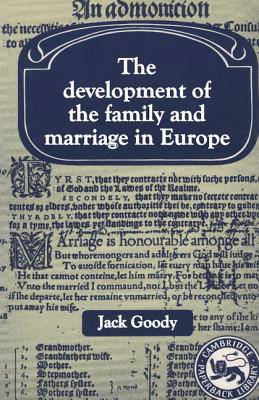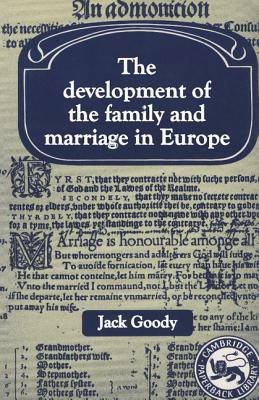
- Retrait gratuit dans votre magasin Club
- 7.000.000 titres dans notre catalogue
- Payer en toute sécurité
- Toujours un magasin près de chez vous
- Retrait gratuit dans votre magasin Club
- 7.000.0000 titres dans notre catalogue
- Payer en toute sécurité
- Toujours un magasin près de chez vous
Description
Around 300 A.D. European patterns of marriage and kinship were turned on their head. What had previously been the norm - marriage to close kin - became the new taboo. The same applied to adoption, the obligation of a man to marry his brother's widow and a number of other central practices. With these changes Christian Europe broke radically from its own past and established practices which diverged markedly from those of the Middle East, North Africa and Asia. In this highly original and far-reaching work Jack Goody argues that from the fourth century there developed in the northern Mediterranean a distinctive but not undifferentiated kinship system, whose growth can be attributed to the role of the Church in acquiring property formerly held by domestic groups. He suggests that the early Church, faced with the need to provide for people who had left their kin to devote themselves to the life of the Church, regulated the rules of marriage so that wealth could be channelled away from the family and into the Church. Thus the Church became an 'interitor', acquiring vast tracts of property through the alienation of familial rights. At the same time, the structure of domestic life was changed dramatically, the Church placing more emphasis on individual wishes, on conjugality, and on spiritual rather than natural kinship. Tracing the consequences of this change through to the present day, Jack Goody challenges some fundamental assumptions about the making of western society, and provides an alternative focus for future study of the European family, kinship structures and marriage patterns. The questions he raises will provoke much interest and discussion amongst anthropologists, sociologists and historians.
Spécifications
Parties prenantes
- Auteur(s) :
- Editeur:
Contenu
- Nombre de pages :
- 324
- Langue:
- Anglais
- Collection :
Caractéristiques
- EAN:
- 9780521289252
- Date de parution :
- 29-07-83
- Format:
- Livre broché
- Format numérique:
- Trade paperback (VS)
- Dimensions :
- 135 mm x 215 mm
- Poids :
- 335 g

Les avis
Nous publions uniquement les avis qui respectent les conditions requises. Consultez nos conditions pour les avis.






